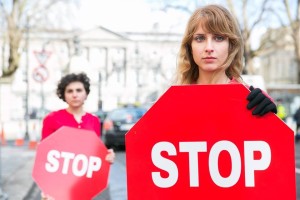
By Ann Marie Foley - 11 November, 2014

A new radio advertising campaign from the Immigrant Council of Ireland aims to put the spotlight on those who exploit and abuse women in the sex industry.
The new advert, which went out on radio from Monday, features a pimp verbally abusing a woman, illustrating what violence and exploitation can involve.
The Irish Congress of Trade Unions has also voiced concern for the welfare of sex workers stating that recent media coverage of the issues surrounding prostitution could have given an impression that this is a trade that people enter into freely, and is “part of the service sector which just happens to be illegal.”
In a letter to the Irish Times, Edward Mathews, Director of Regulation and Social Policy, Irish Nurses and Midwives Organisation INMO, stated “The Irish Congress of Trade Unions remains firm in its view that prostitution is exploitation and not employment.”
He explained that the union’s involvement in the Turn Off the Red Light campaign dates back to 2010, when a motion was passed at the Irish Congress of Trade Unions (ICTU) women’s conference.
Since then Congress and its constituent unions have made written submissions and presentations to the justice committees in the Oireachtas and at Stormont in Northern Ireland.
“We accept the evidence of An Garda Síochána that most of the cash generated from prostitution goes to organised criminal gangs, both foreign and domestic, and reject the notion that pimps and traffickers will become model employers overnight if given the opportunity to do so,” he stated.
In his letter he also pointed out that globally trafficking for sexual exploitation puts $99 billion into the pockets of criminals each year.
“The notion that legalisation will improve the situation of those involved is incorrect, and will lead to the continued perpetuation of degradation and abuse,” he stated.
He objected to comments made in the Irish Times which he claimed portrayed the Turn of the Red Light Campaign as a “conspiracy that involves the religious right, radical feminists and trade unionists.”
He does not specifically mention which article he refers to.
Following a call by groups, such as Turn Off the Red Light Campaign, to criminalise people who pay for sex, there were interviews in the Irish Times with sex workers, and their representative groups, who did not agree with this position.
One sex worker, Kate McGrew, in an interview published on 3 November, said that such a call is “patronising and misguided”.
The article goes on to say that the campaign (to criminalise those who pay for sex) is “moralistic”.
Edward Mathews stated that membership of the Turn Off the Red Light Campaign includes front line emergency workers, business people, rape crisis centres, farming representatives, student representatives and many others.
It also has the support of political parties including Labour, Sinn Féin and Fianna Fáil, and many more individual representatives from other parties, including the Fine Gael members of the Oireachtas Justice Committee.
“These groups, far from condescending to others, are advocating on behalf of those whose horrible reality they witness, and which is expressed by those seeking support,” he stated.
While this reality is linked to the trafficking of persons, it also blights long-term residents and citizens of Ireland.
The issue of trafficking has also been raised in Rome and Agenzia Fides has reported that the International Organisation for Migration (IOM), denounced an increase of 300% of women potential victims of trafficking in prostitution.
In 2014, some 16,839 women have arrived from in Italy, while in the same period of 2013 there were 5,163, explained the Head of Mission of IOM office.
“We have noticed in particular a significant increase in young girls from Nigeria: 1,290, approximately 300% more than the 392 who arrived last year,” the IOM office head said.
This year the organisation has formed anti-trafficking groups in Sicily and Puglia to strengthen the detection and identification of victims of exploitation.
These groups come into contact with the girls immediately after landing at the port and inform them about their rights before they can be approached by exploiters.
Often they are lured in their countries of origin with the promise of finding a job in Italy. During the journey they often find themselves in a state of semi-slavery and are forced into prostitution and are raped during the journey.